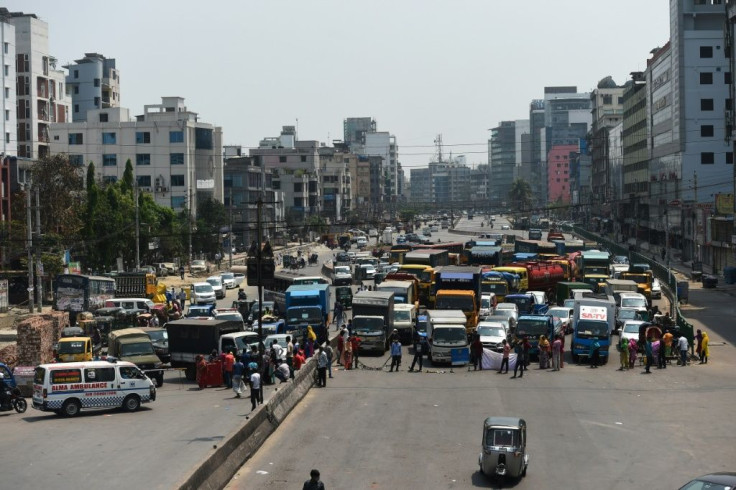How The Bangladesh Diaspora Is Helping Their Homeland Reeling From Coronavirus Shutdown

KEY POINTS
- Bangladeshi's government recently introduced an $8 billion financial stimulus package
- Bangladesh depends heavily upon remittances sent home by people in the diaspora
- Remittance inflow contributes about 12% to Bangladesh’s GDP
Some members of the Bangladeshi diaspora in the U.S. have mobilized to send help to their countrymen who are living under a government-imposed lockdown that has been extended through at least Apr. 25 in response to the swirling COVID-19 crisis.
As of Sunday, Bangladesh had 621 confirmed cases of COVID-19 with 34 deaths.
While the Bangladeshi government recently introduced an $8 billion financial stimulus package, the program does not include direct cash transfers to the poor. Without work to go to, untold numbers of poor Bangladeshis are suffering.
Shafquat Rabbee, an academic at the University of Dallas in Texas, is among those organizing relief efforts.
"The absolute poor people [in Bangladesh] really don't eat a lot and they don't have the luxury to eat varieties of food," Rabbee said, "We, the privileged ones can help them get these [foods] in this time of crisis."
Rabbee raised $10,000 within two days, mostly donations from complete strangers. "It was fascinating to watch people's selfless response," he said.
Rabbee is working with a group of volunteers and small organizations – including Resource Coordination Network, or RCN, a Dhaka-based non-profit -- to help provide food on the ground in Bangladesh.
"They [volunteers] are taking great personal risks by distributing food supplies amid this pandemic," he said. “Instead of distributing food en masse, one-off, on the street, I am trying to do something a bit more sustainable. I will feed for three months 100 families who lost their livelihood during the [coronavirus-related] shutdown.”
Mahia Rahman, co-founder RCN, said: "We have been receiving quite a lot of funding from Bangladeshi people living abroad.”
Shoron Rahman, a volunteer with RCN, said the money they receive are used to purchase essentials like rice and lentils to feed the poor.
"We are providing them with the supply for a month so that it becomes sustainable and they don't need to reach out to others for any further help," Rahman said.
Anwar Ali, a worker, was grateful for the food. "I had no income for the past two weeks. Now at least I can feed my kids with this," he said.
Najneen Sultana, a Bangladeshi student in Boston, is raising funds to donate Personal Protective Equipment, or PPE, to doctors and health workers in Bangladesh where there is a dire shortage of such items.
Sultana contacted a ready-made garment firm in Bangladesh that can manufacture a set of PPE for just $4 each.
"I am raising $15,000. We are going to contact [the Directorate General of Health Services in Bangladesh] and some [non-governmental organizations] in Bangladesh for distributing the PPE among the doctors," she said.
Razoana Moslem, a Bangladeshi lawyer living in Australia is raising funds for Bangladeshi students living in Sydney who cannot work to support themselves and pay for their studies.
"Now with [the] COVID-19 outbreak, they are not able to work and in need of basic things like groceries. I am raising funds to help them," Moslem said. "[The] COVID-19 outbreak has affected us all. But if those of us who are in relative comfort come forward to help the people in need, then we can come out of this crisis together.”
Meanwhile, Bangladeshis in Europe have asked the Bangladesh government and Prime Minister Sheikh Hasina to protect the rights of the country’s migrants who have returned to hostility from their home country during the coronavirus pandemic. Some of the returnees were assumed to have been infected and shunned by their countrymen.
“Migrants are being blamed on social media for bringing the coronavirus from abroad. It humiliates the returnee migrants and many of them were physically assaulted in many parts of Bangladesh,” read a joint statement by various Bangladeshis in Europe.
Bangladesh depends heavily upon remittances sent home by 10 million of its people in the diaspora – however, these cash payments have also been hit hard by the virus-linked lockdowns around the world.
In March, these remittances amounted to $1.29 billion -- the lowest level in 15 months – and a 12.84% drop from February.
Remittance inflow contributes about 12% to Bangladesh’s gross domestic product.
Ahsan H. Mansur, executive director of the Policy Research Institute of Bangladesh, warned: “Many of the expatriates have returned home. Those who are still abroad cannot work as everything is shut [down]. How will they send money to their families when they themselves are struggling to get by?”
Mansur added: “And the situation is worsening by the day. Oil prices have dropped below $20 [per barrel] in the international market. We receive most [remittances] from the Middle Eastern countries whose economy is based on oil.”
© Copyright IBTimes 2024. All rights reserved.





















